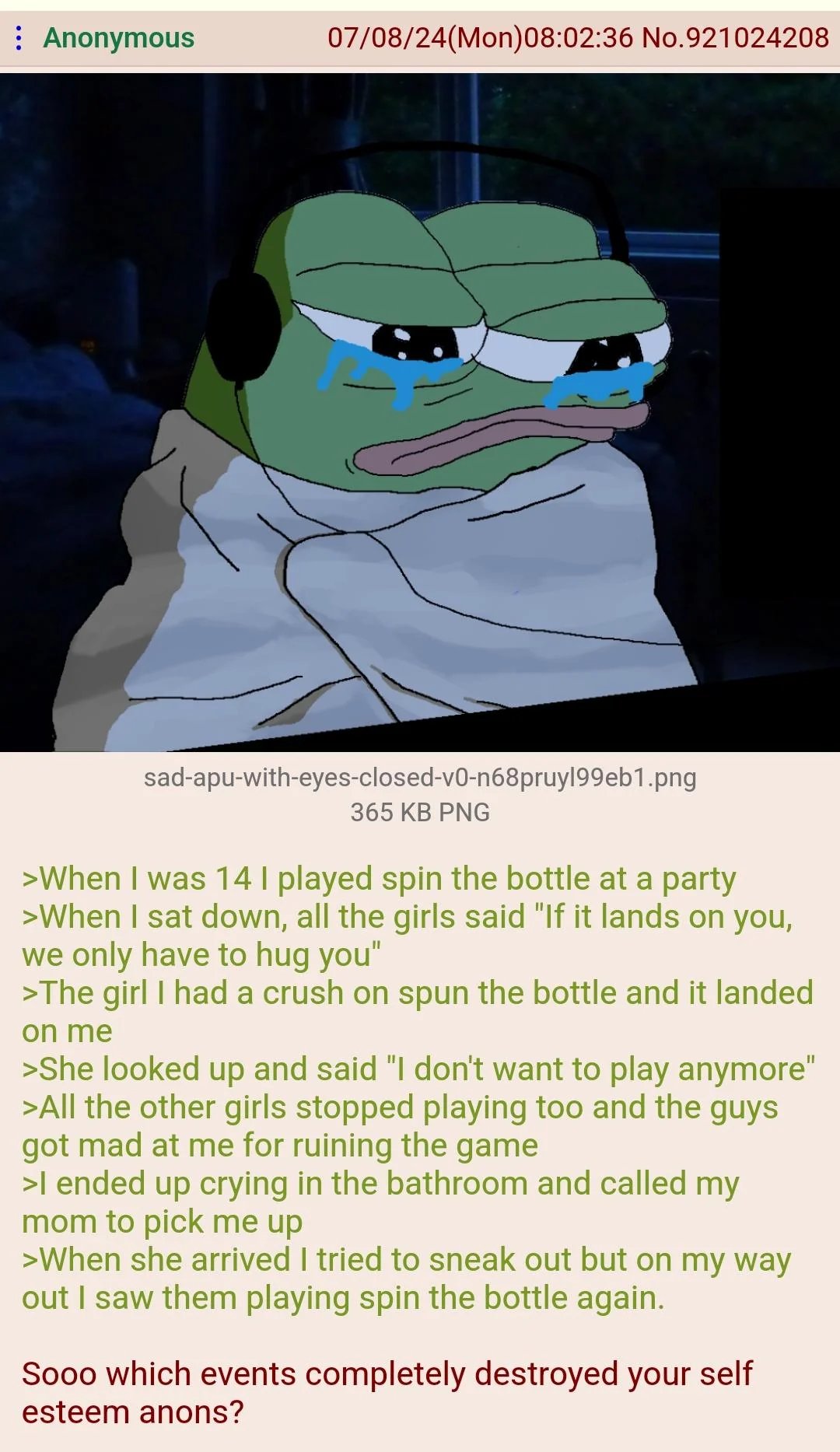this post was submitted on 04 Dec 2024
716 points (98.5% liked)
Greentext
4593 readers
737 users here now
This is a place to share greentexts and witness the confounding life of Anon. If you're new to the Greentext community, think of it as a sort of zoo with Anon as the main attraction.
Be warned:
- Anon is often crazy.
- Anon is often depressed.
- Anon frequently shares thoughts that are immature, offensive, or incomprehensible.
If you find yourself getting angry (or god forbid, agreeing) with something Anon has said, you might be doing it wrong.
founded 1 year ago
MODERATORS
you are viewing a single comment's thread
view the rest of the comments
view the rest of the comments

If there is even just a chance that others wouldn't understand, let alone disapprove you associating with kid X, you can accomplish 2 things by ousting them: 1. You get rid of the potential disapproval (wich is mostly just insecurity) 2. You help an ingroup getting rid of unambiguousness, by drawing/strengthening the border to the outgroup, while with the same move placing yourself on the inside.
I work with kids, and so far I think this is the objective rationality behind most or at least many acts of cruel exclusion.
The only long term, non authoritarian solution is the kids developing a moral compass, that makes violent exclusion more important to them than short term insecurity-management and of course beeing less insecure. (Plus the "weird ones" often have fluffin interesting perspectives)
As we can see in comments like "shower more" even many adults didn't recover from the competitive-acceptance-bs other kids/their parents/ this fucked up society gave them.
Yeah, not happening. I've really tried, and the most effective thing is providing external consequences for undesirable behavior, as in loss of privileges. I was a pretty chill kid, and I can't say I had a properly working "moral compass" until my mid-20s, if that. I didn't bully anyone, but I was secretly happy when bad things happened to people I didn't like.
So yeah, stick with the first two, you'll probably have more success than trying to instill morality into kids who are still harboring resentment at not getting to pick the first slice of pizza last week.
Yes, happening. Empathy and morals (which are party sort of systemized empathy) do develop. Needs time and good relationship circumstances though. I'm in outdoor pedagogy and I'm pretty sure kids make a lot of progress with some help here and there.
School as both the no 1 pedagogical field and an institution of selection and disciplination (hello competition, hello human market) isn't a great place to progress in that.
Yup, and time is the issue here. My kids are way better than their peers IMO, and my kids' teachers have said as much (not sure if they're just buttering me up though). But they're still amoral little jerks a lot of the time. They'll get there eventually, but my point is to not rely on that and instead mitigate the worst of it while their moral compass is getting calibrated.
That sounds good and healthy to me. It's definetly part of any pedagocial role to mitigate the worst. I mean I strongly advocate for hope in the good in kids and teach/allow them to make this world a better place than we managed to so far, responsibility and all kinds of compasses. But surely they are idiots and need to rely on us mitigating that!
Ok hol up. I had to read this 10 times. Reads like AI
Are you saying you think kids are quick to push otherness away because they themselves are insecure? And as a bonus, alot of them don't gain confidence even into adulthood?
I'd just like to say that I didn't find it read like AI personally
I agree, this does not at all read like GPT
Thank you lol
Haha yeah sorry I'm sick and kinda slow rn.
Yeah basically that's what I said but I also tried to describe the rational of being mean and contextualize it in a broader mode of socialization.
This is to not just go "kids are brutal" but add additional understanding, which in turn is meant to help forgiveness (in a sense of reducing hurt) and see the involvement of social order (competition does no good to hoomans).
You know, like the kids are alright but society isn't yet so they aren't. This sucks but doesn't have to forever.
Exactly. Most bullies bully others because that's how they feel more secure about themselves. Most of them live in broken homes, so they're used to being pushed away, so they push others away.
The immediate solution is to stand up for yourself. The longer term solution is to befriend them, which can fill that hole they've been trying to fill with bullying.